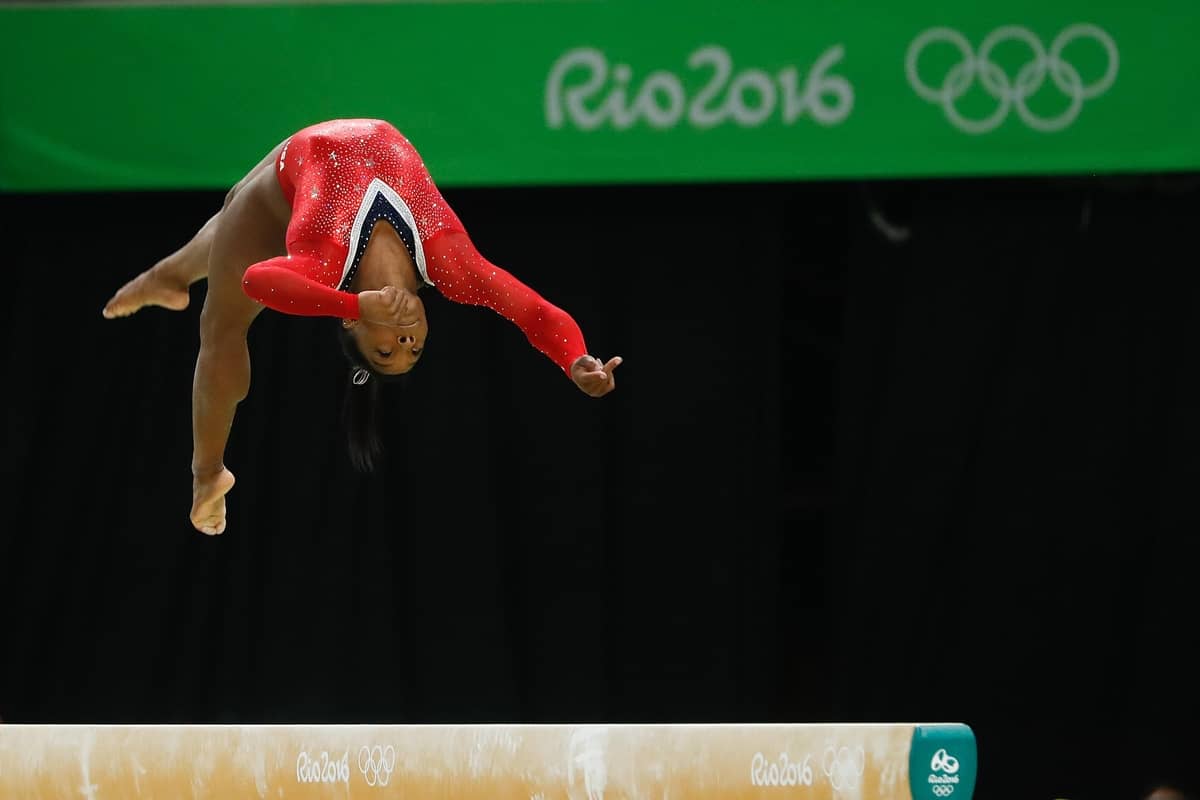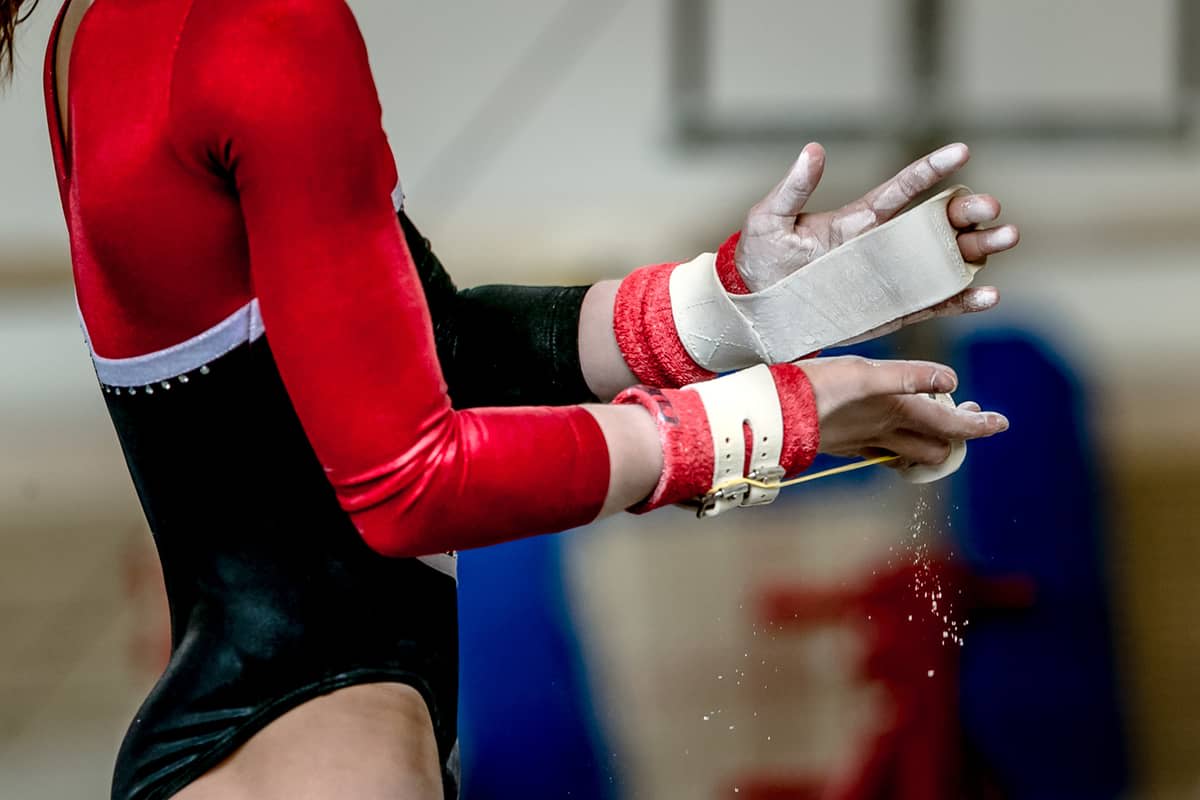
There have been a few standout images from the 2021 Olympic Games so far, and they tell an important story about the way gendered stereotypes and social norms are being challenged, and are shifting.
Early on, we saw the German gymnasts make international headlines when they took a stand against sexualisation, and chose to compete in tights or unitards rather than the usual high-cut leotards.
Then we saw US gymnastics superstar – and sexual abuse survivor – Simone Biles withdraw from the women's gymnastics’ team final, stating she wasn’t mentally ready.
More recently, we’ve seen Team Great Britain champion diver Tom Daly knitting in the crowd, while watching the women’s diving final, and last week the US men’s fencing team wore pink masks. (More on that later.)
Representation matters
Why do these images matter? They matter because they’re all, in their own way, and to varying degrees, acts of defiance from powerful role models; acts that challenge our notions of what it is to be a male or female athlete/a man or a woman.
They also matter because around the world, people – including children – are seeing these images, and incorporating them into their dreams and memories.
And they matter because they’re in stark contrast to other images we’ve seen dominate in the past, and continue to pop up recently.
Remember just two weeks ago when the Norwegian women’s beach handball players made international headlines because they refused to play in bikinis and were fined by the European Handball Federation for “improper clothing”?
You may also have heard that on the same day, at the English Championships, long-jumper Olivia Breen, double world champion and British Paralympian, was told by a female official that her shorts were “too short and inappropriate”?
Viewed in isolation, these incidents may seem trivial and even amusing. But viewed in the broader social context of gendered stereotypes and violence, they present a picture of the challenges being faced by women in elite sport, and of emerging change.

Connecting the dots
These incidents underscore a long history of sexualisation and policing of women’s bodies and behaviours. It’s an experience universal to women, not just those in the sporting world – one that’s directly related to the all-too-common occurrence of gender-based violence, including sexual assault.
The media coverage and public discussion that ensued are representative of the literal tip of the patriarchal iceberg faced by female athletes.
When viewed together, they’re illustrative of conflict surrounding the widespread culture that places female – and non-gender-conforming – athletes under immense pressure. This pressure regarding how they look, what they wear, and the scrutiny placed on their bodies and behaviours makes for additional mental and emotional hurdles they must overcome.
Connecting the dots between these incidents and recent withdrawals by high-profile sportswomen from events they’ve worked so hard towards is well overdue.
This includes two-time Olympic silver medal-winning swimmer Maddie Groves, who pulled out of the Australian Olympic trials in June, saying there were “misogynistic perverts” in the sport. It includes tennis player Naomi Osaka, the world’s highest-earning female athlete, who withdrew from the French Open in the same month after being penalised for skipping a press conference. It also includes Biles’ withdrawal.
Many media commentators have been quick to judge the move by Biles as tactical, going as far as to say she’s quitting on her teammates – a particularly heinous claim when you consider what Biles has been through in relation to rapist-child pornographer (and former team doctor for the United States’ women's national gymnastics team) Larry Nassar.
Thankfully, some, such as Sally Jenkins from the Washington Post, have been quick to highlight the invisible lines connecting the dots, and the defiance at the heart of Biles’ withdrawal.
Choosing to report on the facts, Jenkins wrote that just two weeks ago a report was released on the Nassar case, which exposed new details regarding how corrupt officials hushed up evidence that the gymnastics doctor was a serial sex assaulter. Nassar's decades-long abuse of up to 368 women and girls included Biles’, and there’s no doubt she would have been aware of these revelations.
Shortly after withdrawing, Biles retweeted a statement from fellow gymnast and coach Andrea Orris that read: “It makes me so frustrated to see comments about Simone not being mentally tough enough or quitting on her team. We are talking about the same girl who was molested by her team doctor throughout her entire childhood and teen years ... That girl has endured more trauma by the age of 24 than most people will ever go through in a lifetime.”
From a gymnast friend regarding Simone Biles 🐐❤️ pic.twitter.com/4eWPIgi4yf— Brandon Marino (@TheBatMarino) 27 July, 2021
Sometimes, walking away is the only way to highlight a lack of confidence in an institution, and the greatest act of defiance.
It’s important also to highlight that while gender inequality, including rigid gender stereotypes, provides the underlying condition for violence against women, it’s often experienced in combination with other forms of discrimination and inequality, including racism.
The misogyny experienced by women such as Osaka and Biles, and Serena Williams before them, combined with racism, on top of the already considerable pressures of elite competition, creates an enormous burden.
The times are changing
It’s not surprising to see women walking away, both as a sign of exasperation, but also as a sign of defiance.
What we’re starting to see is a kind of reckoning. A calling-out of the denial and diminishment of women’s experiences. An emerging understanding of the connection between a lack of choice in relation to bikinis, gender-based violence, and the damage done to phenomenal athletes such as Biles.
Things are changing. Not as fast as we would like, but they are changing.
Voices of empathy and reason within the media, such as Jenkins’, are growing. Voices spewing misogynistic and racist hate are being called out.
But even more inspiring and encouraging are the stances being taken by athletes such as Biles and Osaka. These women are leading by example.
Around the world, young and old alike are watching these athletes speak up and stand up for themselves when professionally the stakes could not be higher.
Biles has said she’s driven to be a voice for change: “If there weren't a remaining survivor in the sport they would've just brushed it to the side.”
At the time of her withdrawal from the French Open, Osaka tweeted: “anger is a lack of understanding. change makes people uncomfortable.”
These actions resonate, and they’re a warning shot – the days of sexualising and policing of women's bodies and behaviours are numbered.
anger is a lack of understanding. change makes people uncomfortable.— NaomiOsaka大坂なおみ (@naomiosaka) 30 May, 2021
If we’re not willing or sure how, then we need only look to those US fencers taking a stand against one of their own who has been accused of sexual misconduct – athletes themselves who are making it clear that enough is enough. It doesn’t look like masks are going anywhere anytime soon, so why not make it a pink one? Perhaps knitted?
Part of how the culture of silence and complicity around sexual assault changes is other men holding their peers accountable in public spaces
🤴🏻🤴🏿🤴🏿We see you and appreciate you pic.twitter.com/hX09G3Dbyx— Qondi 💛 🐝 🇺🇸🇿🇦🇿🇼 (@QondiNtini) 31 July, 2021





